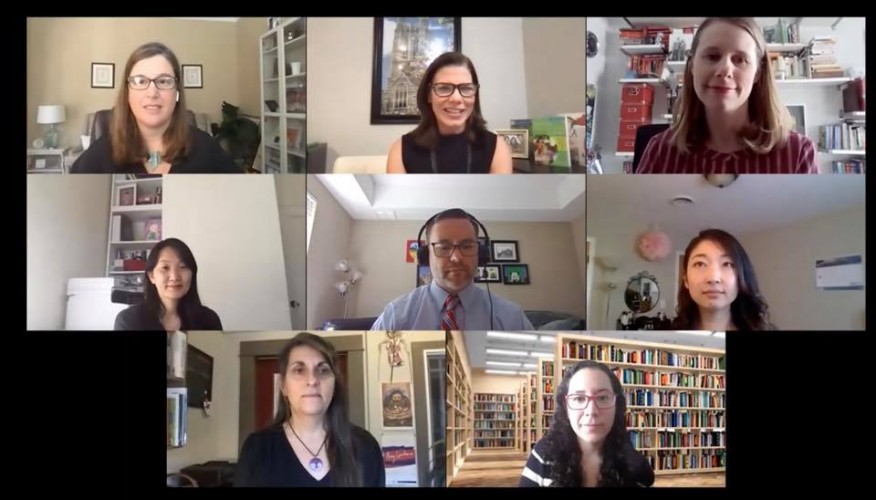SRCD Conference Presentation 1
April 2021
We had several presentations from our lab!
We expanded on one of our 2020 URC presentations by Krystal Bautista, Cecilia Plascencia, Helen Tran, and Hallie Yu and got it accepted into a symposium at SRCD! Ph.D. student Mayu took the lead and presented at the virtual SRCD conference.
Lindblad, M., Plascencia, C., Tran, H., Yu, H., Bautista, K., Zhou, Q., & Uchikoshi, Y. (2021, April 7-9). Parent Acculturation and Head Start DLL Preschoolers’ Oral Proficiency [Symposium]. 2021 Society for Research in Child Development Biennial Meeting. https://www.srcd.org/event/srcd-2021-biennial-meeting
Previous studies support the influence of parental acculturation on their children’s academic achievement, values, identity, and family relations (Baker, 2018; Liu et al., 2009; Knight et al., 2011; Luo & Wiseman, 2000; Smokowski et al., 2008). Prior research also suggests that parental language proficiency has an effect on children’s language proficiency (Liu et al., 2009; Quiroz et al., 2010). However, few studies have examined the roles of parental acculturation and parental language proficiency on child achievement in the early childhood years. However, as preschool oral language skills have been shown to predict future academic achievement (e.g. Kendeou et al., 2009; Snow et al., 1998), it is critical to understand the associations among parental acculturation, parental language proficiency, and bilingual oral proficiency with young immigrant children.
Furthermore, few studies have examined different immigrant groups from the same areas to understand possible similarities and differences between immigrant groups. For dual language learners, parents play an important role in passing their cultural and language knowledge of their heritage to their children as they engage their children in sociocultural practices that are based on their cultural values (Rogoff, 2003; Luo et al., 2013; Tamis-LeMonda et al., 2019). To address these gaps, this study will examine these topics with two of the largest and fastest-growing immigrant populations in the U.S., Mexican-American and Chinese-American families (Park et al., 2017).
In this study, a total of 119 dual language learners (DLLs) (55 Mexican-American and 64 Chinese-American) enrolled in Head Start centers and their families in Northern California were recruited. DLLs were assessed on oral language measures in both their and English using the picture vocabulary, oral comprehension, and understanding directions subtests of the Woodcock Johnson Tests of Oral Language (Schrank, Mather, & McGrew, 2014). Parents were interviewed on acculturation and language proficiency measures using the adapted Parent Ethnic Identity (PEU; Zea et al., 2003), Parent Family Ethnic Socialization Scale (PFES; Umaña-Taylor et al., 2013) and Cultural and Social Acculturation Scale ( CSAS; Chen & Lee, 1996; Chen & Tse, 2010).
Results showed no significant differences between Mexican-American and Chinese-American parents on their acculturation and enculturation levels. Furthermore, there were no significant differences in the bilingual oral proficiencies between Mexican-American and Chinese-American DLLs. A cluster analysis identified four new groups of DLLs based on their language proficiency in each language: high proficiency in both, low proficiency in both, English-dominant, and -dominant. Results show that parents of children who were English-dominant had significantly higher levels of American identity than the parents of children with higher proficiency in both languages. Furthermore, parents of children who were English-dominant had significantly lower proficiency than the parents of children who had lower proficiency in both languages. Results suggest that acculturation levels and proficiency of the parents may support their children’s bilingual oral proficiency. Implications will be discussed for immigrant families with young children.









